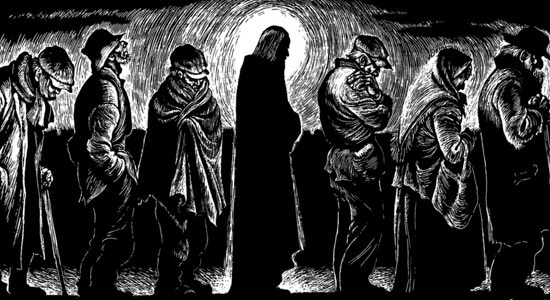Beggars and Choosers
Homily for Sunday, October 12, 2025: 28th Sunday in Ordinary Time
It is said that “beggars can’t be choosers.”
I’m reminded of a time, many years ago, when I was volunteering at a soup kitchen and one of the clients came up to me with the complaint: “I can’t eat this [expletive redacted].”
It stood out in my mind, in part, because earlier that day, at my regular job working at a lunch counter, I’d had a very similar complaint from a customer. It made me stop and think about these two men – the beggar and the paying customer – and my own reaction to each of their complaints. My job was the same in both cases: to give good food to those who need it. They both got what they came in for. There was no defect, nothing objectively wrong with the food we served. They just didn’t like it. I wondered: how is it fair that one gets special treatment, while the other is expected to be grateful for whatever he gets?
Our first reading today from Second Kings gives us the end of a longer, more involved story. If we go back a bit to the beginning of the chapter, we are introduced to Naaman – a foreign army commander who goes to Israel seeking a cure for his leprosy. When the prophet Elisha tells him to bathe seven times in the Jordan River, Naaman goes away angry. “I’ve got rivers at home, why did I come all this way just for this?”
But his servants calm him down. They say to him, “If this prophet had given you some big elaborate ritual, you’d do it. But here he has given you a simple and easy cure, shouldn’t you try it?”
The end result is what we hear in today’s reading. Naaman swallows his pride. He bathes himself in the Jordan and is cured. God does not hold his earlier ingratitude against him, but transforms it into gratitude.
In today’s Gospel we hear of Jesus healing some lepers. Only one gives thanks, but all ten are healed. Jesus doesn’t withhold his healing, doesn’t revoke it, doesn’t repossess His graces due to a lack of gratitude. What he gives, he gives freely to all.
Jesus does not distinguish between the beggar and the paying customer, because there is no payment for his graces. Our life, our health, our comforts and welfare, but also his own life on the cross, his body and blood here on the altar and in the Eucharist. He sustains both our physical and our spiritual well-being. There is no price we could pay, no exchange we could make, no remuneration that could come close to the value of what he gives us. In his eyes we are all equals – we are all beggars.
Saint Paul sums it up nicely, I think, when he says “if we are unfaithful, he remains faithful, for he cannot deny himself.” He cannot deny the healing, life-giving, saving power he offers us each and every day.
Still, everyone likes to be appreciated at least once in a while. Even Jesus called out those nine.
Gratitude is an important, perhaps a too-often overlooked virtue. But gratitude strengthens our relationships, it builds up our appreciation of one another. When we’re grateful, people like us more. We’re generally easier to get along with. It’s true of our relationships with other people, and it’s true of our relationship with God.
I said earlier that before God we are all beggars. But God in his kindness does not make us beg. His gifts, his graces, all his goodness is offered to us before we ask. While the world says that beggars can’t be choosers, God gives us the choice to accept his graces, or not; to respond with gratitude, or not.
Just this past week, Pope Leo released his first Apostolic Exhortation; Dilexi Te; “I Have Loved You,” in which he reminds us of a central, vital part of our Christian worship. Just as Christ gives of himself so freely to us, we must likewise give of ourselves to those in need: to the poor, the sick, the vulnerable, and the outcast. We must remember that we are all equal in God’s eyes and must treat one another as equals and give as generously as we have received. That is how our love of the Lord, our gratitude toward him, becomes real.
As with those ten lepers, Jesus gives us his blessings, his graces, his whole self, freely. The question for us, then, as we come forward to receive him, is: are we like those nine, who receive this great gift and just go on about our day? Or will we be that one, who recognizes what Christ has done for us and gives glory and thanks to God?


